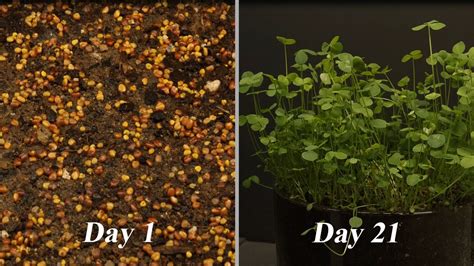Beat the Clock: Fast Clover Sprouting
Clover sprouts—packed with nutrients and boasting a subtly sweet, nutty flavor—are a fantastic addition to salads, sandwiches, and smoothies. But who has time for lengthy sprouting processes? This guide reveals how to dramatically speed up clover sprouting, maximizing your yield and minimizing your wait. We’ll cover everything from seed selection to optimal sprouting conditions, ensuring you enjoy these nutritional powerhouses in record time.
Why Choose Clover Sprouts?
Before we dive into the fast-sprouting techniques, let's highlight why clover sprouts deserve a place in your healthy eating routine. They're an excellent source of:
- Vitamins: Rich in Vitamin C, Vitamin K, and various B vitamins, supporting immune function and overall health.
- Minerals: A good source of iron, magnesium, and calcium, vital for bone health and energy production.
- Antioxidants: Packed with antioxidants that combat free radicals and protect your cells from damage.
- Fiber: Promotes healthy digestion and keeps you feeling full and satisfied.
Choosing the Right Clover Seeds
The foundation of successful, fast sprouting lies in selecting high-quality seeds. Look for:
- Fresh Seeds: Check the expiration date on the packaging. Older seeds may have reduced germination rates.
- Reliable Source: Purchase seeds from reputable suppliers known for their quality control.
- Specific Variety: While various clover types can be sprouted, some varieties sprout faster than others. Research suggests crimson clover or red clover might be good choices for faster germination, though experimentation is key.
The Fastest Methods for Clover Sprouting
Forget waiting days—here are techniques to accelerate your clover sprout harvest:
1. Soaking: The Key to Speed
Soaking clover seeds before sprouting significantly reduces germination time. Simply soak your seeds in filtered water for 4-6 hours (or overnight) at room temperature. This pre-hydration softens the seed coat, allowing for faster water absorption and quicker sprouting.
2. Optimal Temperature: Warmth is Key
Clover seeds germinate best in warmer temperatures. Aim for a consistent temperature between 70-75°F (21-24°C). A warm spot in your kitchen, away from drafts, is ideal. Avoid placing them in direct sunlight, as this can cause overheating.
3. Proper Rinse and Drainage: Preventing Rot
Proper rinsing and drainage are crucial to prevent mold and bacterial growth. Rinse your seeds thoroughly multiple times a day—at least twice—with filtered water. Ensure adequate drainage to avoid waterlogging. This is especially important in the early stages of sprouting.
4. Sprouting Vessels: Choosing the Right Container
Choose a sprouting vessel that allows for optimal air circulation and easy drainage. Glass jars are a popular choice. Some people even use mesh bags, ensuring good air flow. Whatever you use, make sure it is properly cleaned before use.
5. Maximize Light Exposure: A Speed Boost
While not in direct sunlight, sufficient light can improve germination speed. A well-lit area (but not direct sun) is ideal.
Troubleshooting Common Problems
Even with the fastest methods, you might encounter challenges. Here are some solutions:
Slow or No Germination:
- Seed Viability: Check the seed age and source. Old or low-quality seeds might germinate poorly.
- Temperature: Ensure the temperature is consistently within the optimal range (70-75°F).
- Water Quality: Use filtered or spring water to avoid chlorine or other chemicals that might inhibit germination.
Mold or Rot:
- Improper Drainage: Ensure adequate drainage to prevent waterlogging.
- Insufficient Rinsing: Rinse seeds thoroughly multiple times a day.
How Long Does Fast Sprouting Take?
With these techniques, you can significantly reduce clover sprouting time. You should see sprouts emerge within 2-3 days, with a good harvest ready in 3-5 days. Remember that exact timing can vary based on seed quality, temperature, and other factors.
Frequently Asked Questions (FAQs)
Can I sprout clover seeds in a dark place?
While some light is beneficial for faster germination, complete darkness won't necessarily stop the process. However, sufficient light is generally recommended for optimal growth.
How long can I store clover sprouts?
Once sprouted, store clover sprouts in an airtight container in the refrigerator for up to 5 days. Beyond that, they may start to lose their freshness and nutritional value.
What are the best ways to use clover sprouts?
Clover sprouts are incredibly versatile! Add them to salads, sandwiches, soups, smoothies, or even enjoy them as a side dish. Their mild, slightly sweet flavor complements many dishes.
Are there any health concerns associated with consuming clover sprouts?
While generally safe, some individuals might experience mild allergic reactions. If you have a history of allergies, introduce clover sprouts gradually and monitor for any adverse reactions. Always ensure your sprouting practices prevent mold contamination.
By following these fast-sprouting techniques and addressing potential challenges proactively, you’ll enjoy a bountiful harvest of nutritious clover sprouts in record time, adding a delicious and healthy boost to your diet.

